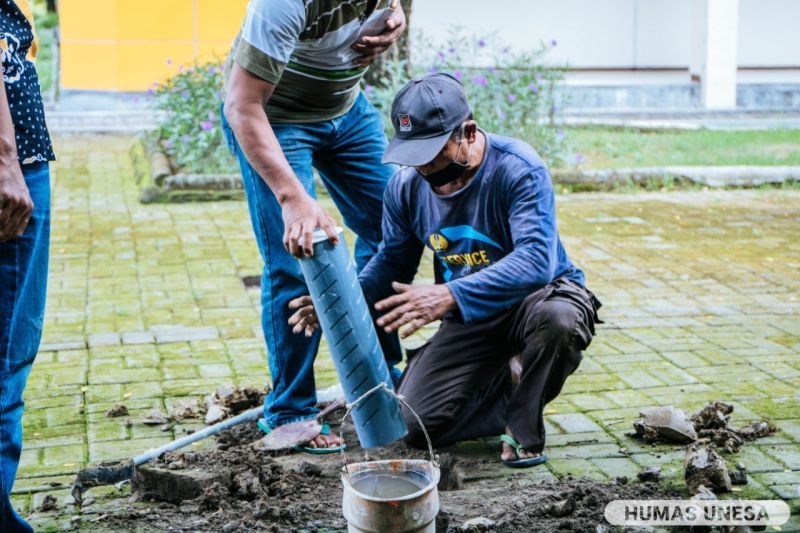
www.unesa.ac.id
Unesa.ac.id, Surabaya-Unesa is committed to continuing to improve the quality of education services and the application of the tridarma of higher education. In addition, it also ensures a beautiful, clean and green campus environment through the implementation of an eco campus program. The form of the program is in the form of structuring green open land into campus forests or independent learning labs which are used as a vehicle for education, conservation and recreation for both the Unesa academic community and for the surrounding community.
Through the eco campus, many activities have been carried out, including the creation and provision of a waste bank, saving electricity and water, and building a small reservoir in the campus area. Apart from that, he also regularly organizes socialization and workshops, one of which is about "Creative Waste Management" as held by the Faculty of Language and Arts Unesa in Joglo FBS on Wednesday (05/05/2021).
The target of these activities is cleaning officers who play an important role in maintaining cleanliness in the FBS environment. The goal is to create environmental awareness and increase creativity in processing waste as part of an effort to make FBS and Unesa as environmentally friendly campuses.
On this occasion, the FBS eco campus team presented two resource persons who are active in waste management, Dra. Yovinza Bethvine S., M.Pd from the Department of Japanese Language and Literature, Unesa and Agus Suwahyono, S.Sn., M.Pd, a lecturer in Sendratasik department as well as the head of the FBS eco campus team.
The two presenters generally delivered material about two waste processing techniques. First, using a biopore pipe or infiltration pipe. The pipe is perforated and then planted perpendicular to the ground. Then it can be filled with organic waste. The use of this technique can produce compost, fertilize the soil, increase water absorption and prevent inundation and even flooding during the rainy season.
Meanwhile, the second technique is a decomposter or technique of utilizing kitchen waste or non-plastic wet waste into liquid fertilizer. The trick, is that the waste is mixed with water and the source of the Promix to produce liquid fertilizer. The process required depends on the starter used, starting from four days and even up to three months.
After receiving the training, it is hoped that the cleaning officers will no longer handle garbage by burning, but instead process the waste creatively and can be used again for other purposes.
The Eco campus team expressed their gratitude to the cleaning staff who have been heroes of cleanliness in Unesa.
One of the cleaners, Heri said that the event was very useful for him and the other cleaning teams. In addition to getting ideas, there are also technical directions on how to properly process waste.
“All my friends here have been assigned tasks, some are cleaning, sweeping, some are caring for flowers and plants. So we are getting more and more years of how to produce compost to care for plants through this event, "he said.
Agus Suwahyono explained that the FBS eco campus was formed in 2015 to create an environmentally friendly campus. It is not only shady, lush and green, but also comfortable and healthy. Not burning trash and polluting the air is part of a healthy environment.
He continued, the FBS eco campus had won first place in the Eco Campus event in Surabaya. This achievement encourages FBS to continue to maintain this predicate in real terms.
"The achievement of the FBS eco campus encourages all of you to keep active and improve the quality, because the predicate is a trust and a mandate to protect the environment, especially a healthy environment." he said.
In addition, Yovinza Bethvine explained that the relationship between humans and nature is 4M, namely, (1) organizing, (2) maintaining, (3) maintaining and (4) preserving. "The environment must be cared for because we only lend it to our children and grandchildren," he said. (yud / zam)
Share It On:






